greggman / Happyfuntimes
Programming Languages
Labels
Projects that are alternatives of or similar to Happyfuntimes
HappyFunTimes
DEPRECATED
I'm deprecating happyfuntimes. I'll keep the rendevous server running for a while longer but I think it's unfortunately time to mostly depreciate this project
i'll consider accepting PRs still if you want to fix something but otherwise just fork it if you want to keep using it
Issues
There are a few major issues on why
device orientation is no longer usable
Both Safari and Chrome have made getting device orientation require HTTPS which is something HFT can't provide at the moment. It would require $$$$$$$. If a end-user friendly solution comes up maybe I'll revisit
Browsers break stuff
Every year or so a browser changes something or breaks something. Over the course of HTF browser broke fullscreen support, audio support, touch support, orientation support, and other things. It's no fun to keep up on that
OSes break stuff
For whatever reason networking that work before stops working. HFT has to do some things to find out all the ways your phone might connect to the game and that stuff seems to break every 2 years or so
Offline Support breaks
Using HFT without internet breaks every few year and will likely eventually be unfixable. Both iOS and Android ping Apple and Google respectively when you connect to WiFi to check if you're acutally on the internet. HFT tries to send them fake data so they believe they are, otherwise they'll stop using the WiFi and switch to mobile.
How they do this changes every few years so HFT has to figure out how to change its faking. It is within Apple and Google's power to make this faking impossible and I supsect they might at sometime which is scary because if they do then there is no solution (well, short of acutally providing internet access)
More browser features require HTTPS
This is really #1 and #2 repeated but more and more browser features require HTTPS and as it says above there is no way for hft to provide HTTPS at the moment.
Good news
If you don't need device orientation and you have no need for offline mode/installation mode then HFT still works. Write your own controllers to keep up to date with the latest changes in the browsers.
Bad news
I don't really have time to keep it running.
Want to play?
Make games with Unity?
Make games with HTML5?
Docs
Other
Support
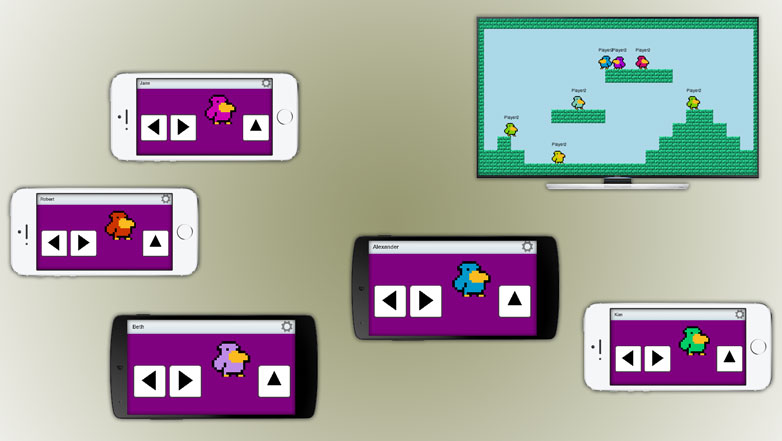
HappyFunTimes is a system for playing party games that are meant to be played with a bunch of people in the same room and 1 ideally large display.
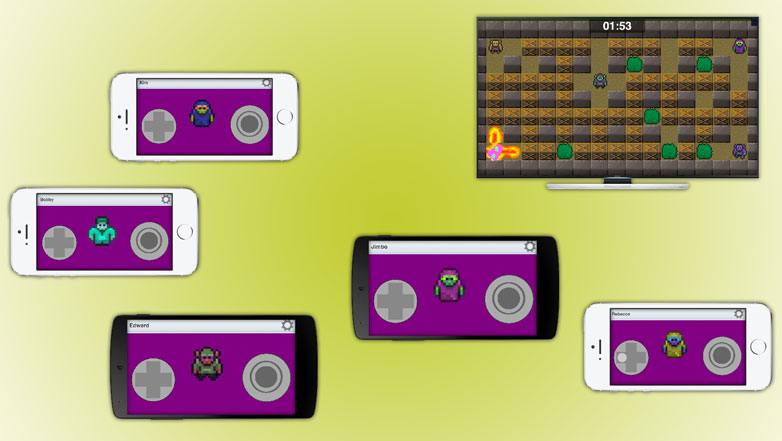
People participate in the game using their smartphone by going to a webpage provided by the game. The webpage lets them use their phone as a controller. This lets you make games that support more than the typical 4 players.
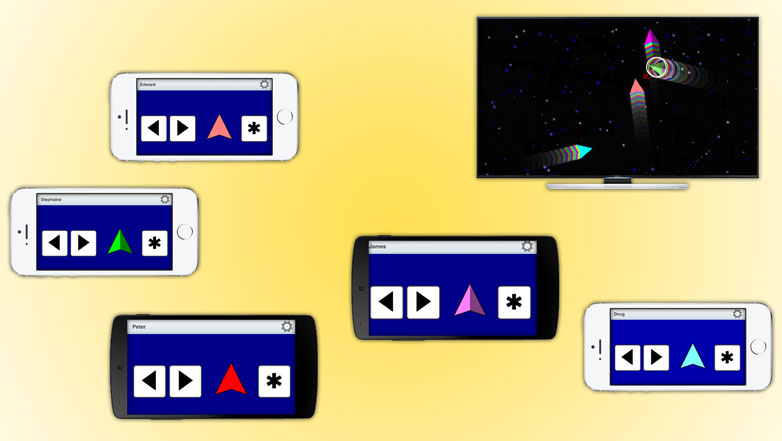
I suppose theoretically there's no limit to the number of players.
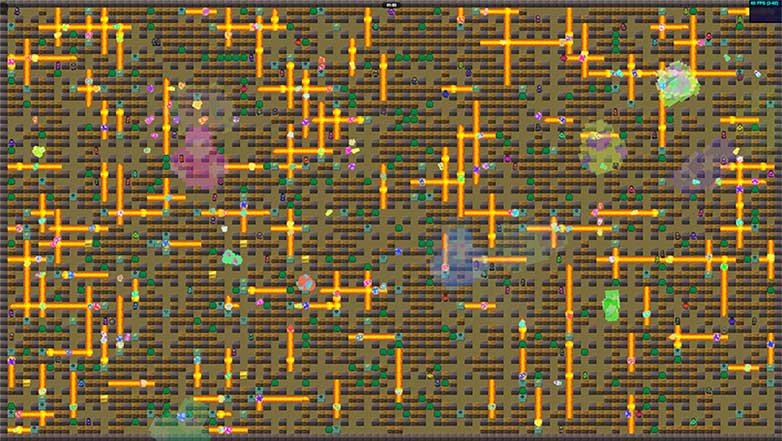
It also lets you make games with unique controllers.
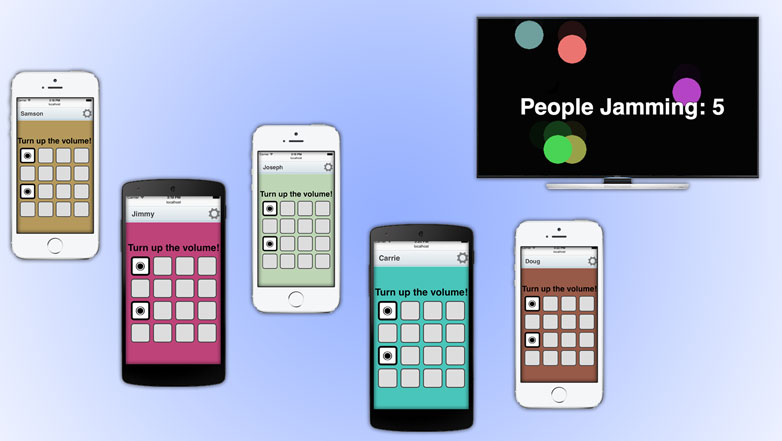
There's a Unity3D library if you'd like to make the game in Unity3D.
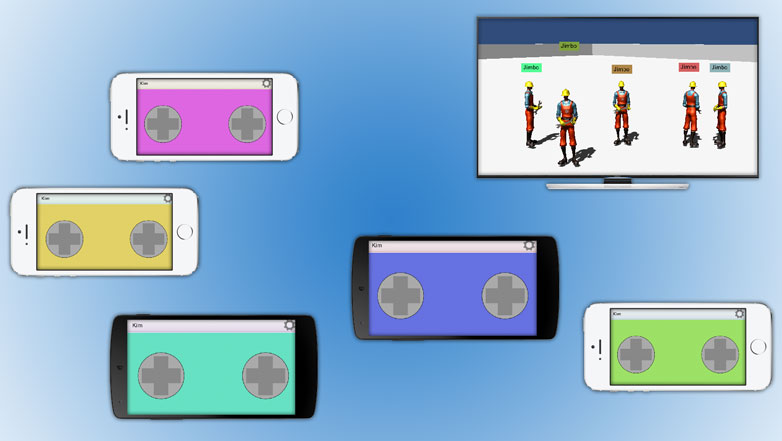
-
The smartphones end up just being smart controllers.
As there is just one machine running the real game this means they are relatively easy to create. No crazy networking, state syncing, or dead reckoning required.
-
JavaScript libraries for the browser and Unity3D libraries are provided
This makes it easy to bang out a game. Use any JavaScript framework or Unity3D.
-
For controllers the sky is the limit.
-
Have a one button game. The user touches their screen.
-
Make virtual DPads
-
Make virutal paddle controllers (think Pong)
-
Have users choose answers to question like Jeopardy
-
Access the camera, send selfies to the game.
-
Emit sound effects from the phone
-
Use the device orientation API and rotate something in game to match
-
Make a rhythm band where each device becomes an instrument.
-
Make a rhythm game like Parappa but each person is a different color so that they each have to play their part at the right time
-
Let the user draw something on their phone. Insert that drawing into the game.
-
Show diagrams. Let the user plan out football plays.
-
Controllers can change dynamically.
Have 2 dpads for the dual stick part of your game. Have a single button for the speed contest. Change to a 3 letter box to let a player enter their high score initials.
-
-
The API is simple to use (for some defintion of simple :D).
Games create a
GameServerobjectvar server = new GameServer();
From that point on anytime a player connects the GameServer will emit an event
playerconnectserver.addEventListener('playerconnect', createNewPlayer);
It's up to you what to do when a new player connects. For example if you had a
Playerobject you might do something like thisvar players = [];
Player = function(netPlayer) { this.netPlayer = netPlayer; // remember this Player's NetPlayer };
// make a new Player anytime the 'playerconnect' event is emitted function createNewPlayer(netPlayer) { players.push(new Player(netPlayer)); }
If the player disconnects or quits the
NetPlayerwill emit adisconnectevent. If we want to handle that we might do something likePlayer = function(netPlayer) { this.netPlayer = netPlayer; // remember this Player's NetPlayer netPlayer.addEventListener('disconnect', Player.prototype.remove.bind(this)); }; Player.prototype.remove = function() { players.splice(players.indexOf(this), 1); // remove ourselves from our array of players. };We can send events to the player's phone by calling
netPlayer.sendCmdFor examplePlayer.prototype.score = function(points) { this.netPlayer.sendCmd('score', {points: points}); };That will cause an event
scoreto be emitted on the player's phone. The player's phone has a correspondiingsendCmdfunction. When called an event will be emitted on that player'sNetPlayerobject. Add listeners for any events you make upPlayer = function(netPlayer) { this.netPlayer = netPlayer; // remember this Player's NetPlayer netPlayer.addEventListener('disconnect', Player.prototype.remove.bind(this)); netPlayer.addEventListener('moveleft', Player.prototype.moveleft.bind(this)); netPlayer.addEventListener('moveright', Player.prototype.moveright.bind(this)); netPlayer.addEventListener('jump', Player.prototype.jump.bind(this)); };Whatever data you pass to
sendCmdwill arrive with the event.... this.netPlayer.sendCmd('die', { reason: "So and so killed you", pointsToLose: 100, });On the phone we create a
GameClientvar client = new GameClient();Just like
NetPlayerabove we can listen for events.client.addEventListener('die', handleDie); function handleDie(data) { console.log("you lost", data.pointsToLose, "points. Reason:", data.reason); }Similarly you can send events to the game
window.addEventListener('pointerdown', function(e) { client.sendCmd('jump', { power: e.mouseY }); });It's up to you to decide which events to send and receive for your particular game's needs.
-
There is also a synchronized clock across machines.
Use it as follows.
var online = true; var clock = SyncedClock.createClock(online); ... var timeInSeconds = clock.getTime();If online is false when the clock is created it will create a clock that returns the local time.
Limitations
The number of players that can connect to a game is limited by your networking equipment. With enough access points there's no limit to the number of player that could connect that I know of but of course 1000s of players would require lots of access points and lots of bandwidth and a game design that lets 1000s of people actually participate.
Another limit in the default mode is players must be on the same network behind
a NAT. This is standard for most if not all home routers. It's probably less standard in
office setups. In this mode you start HappyFunTimes, tell your users to connect to
your WiFi and then have them go to happyfuntimes.net.
HappyFunTimes has the option to run it's own DNS which is another option but
requires configuring your router. This option is probably more suited to
events, installations, and things like that. In this mode, players connect
to the WiFi specificaly setup to run HappyFunTimes. iOS devices will automatically
find HappyFunTimes once connected to the WiFi, no other interaction required by the user.
Android devices require the user to first connect to the WiFi and then go to any random
url like hft.com or h.com.
Notes
-
How secure is this?
Not at all. This is not a library for the internet. It's a library for running a game at a party, meeting, bar, etc...
That said if there's anything easy and performant you'd like to suggest submit a pull request.
-
What about cheating?
Again, this is meant for games where everyone is in the same room watching the same display. If someone is off in the corner trying to hack the game through the net maybe you shouldn't have invited them to your party.
That said if there's anything easy and performant you'd like to suggest submit a pull request.
-
Does it work on Windows, OSX, and Linux?
The controllers of course run in any modern browser. Games run in whatever environment you've created them for. Most of the samples here are HTML and so should run in any modern browser on any platform.
As for happyFunTimes I've run it on OSX, Linux and Windows with no problems.
-
Why not WebRTC?
WebRTC would possibly allow the phones to talk directly the game rather than through the happyfuntimes. happyfuntimes would need to setup a rendevous between the 2 machines but after that the conncetion should be peer to peer.... Or so I'm lead to believe. WebRTC still doesn't currently exist in iOS Safari as of iOS8. It does exist in Chrome.
Feel free to submit a pull request ;-)
